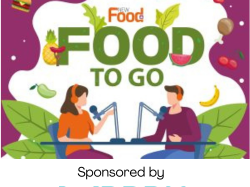Episode 51: Committing to ethical sourcing Part 1 with David McDiarmid
- Like
- Digg
- Del
- Tumblr
- VKontakte
- Buffer
- Love This
- Odnoklassniki
- Meneame
- Blogger
- Amazon
- Yahoo Mail
- Gmail
- AOL
- Newsvine
- HackerNews
- Evernote
- MySpace
- Mail.ru
- Viadeo
- Line
- Comments
- Yummly
- SMS
- Viber
- Telegram
- Subscribe
- Skype
- Facebook Messenger
- Kakao
- LiveJournal
- Yammer
- Edgar
- Fintel
- Mix
- Instapaper
- Copy Link
Posted: 5 April 2024 | New Food Magazine | No comments yet
Princes’ Corporate Relations Director David McDiarmid shares how the international food and drink manufacturer has committed to making its vast supply chain more visible.
This episode of Food to Go is brought to you by Merck Life Science. Explore the possibilities and learn more about Merck’s contribution to this exciting field at www.sigmaaldrich.com/CulturedMeat
In the first part of New Food’s podcast series on ethical sourcing, Josh and Grace speak to David McDiarmid, Corporate Relations Director of Princes to find out how the international food and beverage manufacturer has committed to making its vast supply chain more visible.
In this episode, McDiarmid also delves into the work Princes has done to ensure that its ingredients are ethically sourced and sheds light on the importance of clear communication with suppliers to enhance transparency, sustainability and breaking down cultural barriers.
Are consumers are happy to pay more for something if they are reassured that everyone in the supply chain is being treated fairly and being paid a fair wage?
David McDiarmid (DM): That’s the question of our ages… there are surveys that I see throughout a typical working year that seem to somewhat contradict each other. We are, as a business and as an industry, massively mindful of the cost of living crisis we have been going through and are still facing in this country. That is clearly a concern for us. What we do know is that, certainly from customers but also from consumers, they increasingly want to know more about the ingredients in a product. They want to know more about what’s going into their food and drink and to know whether it’s sustainable or not. The interesting point for me is what would a consumer’s expectation be? I would argue that a consumer’s expectation is that we are all doing the right thing already.
It’s kind of baked into that. However, the reality is, as we stand at the moment, many areas of sustainability do cost more. There’s no smoke and mirrors to that. It’s a simple statement of fact. However, in terms of the premium that sustainable items can attract, now that’s a broad church there. You could have fair trade accreditation, you could have Marine Stewardship Council seafood or tuna etc. So while they do attract that level of premium at the moment, our view is we’ve got to enhance what we do to help flatten that premium.
Related topics
Environment, Ingredients, Recruitment & workforce, Regulation & Legislation, Supply chain, Sustainability, Trade & Economy, World Food





